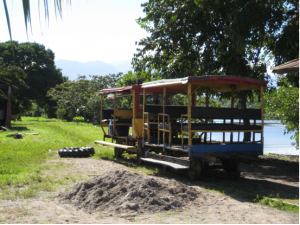Which country has a railway network but never built a station in its capital city? The answer to such a quiz question would be Honduras. An extensive rail system was built a century ago by the international banana companies, United Fruit and Standard Fruit, to get their products to the Caribbean ports. Even fifteen years ago, there were still more than 700 kilometres of track, but none passed through the capital of Tegucigalpa. Now, in any event, only three tiny remnants survive. One of these runs for just nine kilometres, connecting the small village of La Union with the even smaller coastal settlement of Salado Barra.
The line’s original purpose was to carry coconuts and the workers that cut them. It was built by Standard Fruit. Now owned by the grandly-named Honduras National Railways, it provides a daily train leaving La Union at 7.00am, carrying locals and perhaps a few tourists in two open cars, one of which has a diesel engine, with the driver seated between the passengers.
On a sunny morning in December, we were the only people waiting for the train. The driver had set off early and had to be called back so that we could get on it. We passed the backyards of houses in La Union, whose main inhabitants are Garifuna people, descended from slaves who originally escaped from shipwrecked slave traders, and who maintain their own language as well as speaking Spanish. (If you miss the train completely, a couple of villagers will ‘punt’ you down the line on a flat truck called a ‘burra’ or donkey, for the same price as a ticket on the train.)
Outside La Union the houses give way to cattle country. The cattle, accompanied by white egrets, were grazing the grass on the track and had to be shooed away to allow our train to pass. Reaching its full speed of perhaps 20 kph, the driver didn’t slow down for the one passenger he picked up, despite the rickety tracks and shaky bridges. We were headed not just to the coast but to the riverine nature reserve of Cuero y Salado (literally ‘Leather and Salty’, the names of two of the rivers whose estuaries form the reserve).
From Salado Barra you can hire a boat to look for crocodiles, iguana and turtles in the tranquil mangrove inlets of the coastal lagoons. If you are lucky (we weren’t) you might even spot a manatee, as this is one of only two reserves in Central America where this strange mammal can still be found. Although local people appear to support the reserve for the handfuls of tourists it brings, we learnt that many cattle ranchers do not: some had tried to clear parts of the forest in the reserve or had started fires, to extend their ranches.
The driver got ready for the return journey by tipping out the children who were enjoying the shaded seats of the train. Several men (no women) came aboard for the journey back to La Union, sitting with and chatting to the driver, who now had his back to the direction of travel. As we got up speed, he looked over his shoulder from time to time to check that nothing was in the way. This time, the only obstacle was a horse, who grudgingly moved away of his own accord.
As long as outside visitors continue to use it, the line may well outlast the other two remnants of the Honduras National Railways: there is no road to Salado Barra, so it is the only one of the surviving services that can’t easily be replaced by a bus.
Original post: Guardian Weekly


 John Perry lives in Masaya, Nicaragua where he works on
John Perry lives in Masaya, Nicaragua where he works on